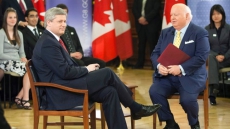VANCOUVER — As British Columbia joins other provinces pledging support for displaced Syrians, an immigration expert says that calls for Canada to accept more refugees fail to address the crucial question of who would foot the bill.
University of Toronto sociology professor Monica Boyd said such requests amount to asking the federal government to pay the tab — about $35,000 per refugee family in the first year.
But the topic of funding is absent from the discussion taking place publicly between a growing list of provinces and Ottawa, she noted.
"They're having a conversation in the middle of a marshmallow," said Boyd, who is also the Canada Research Chair in Immigration, Inequality and Public Policy. "What that means is there are certain things that aren't being said, namely: 'Where's the money coming from?'"
Under current regulations, provinces are legally not allowed to sponsor refugees — only the federal government and private citizens have that power. But that hasn't stopped provinces from chiming in with announcements ranging from demands to boost immigration numbers to provincial funding for refugee support programs.
On Tuesday, Premier Christy Clark announced a $1-million "readiness fund" to help refugees from war-torn Syria settle in B.C.
The one-time investment will provide trauma counselling, assist professional associations to recognize foreign credentials, support job placement programs and help private sponsors navigate the refugee-sponsorship process.
On Monday, Quebec announced it was prepared to take in 3,650 Syrian refugees by the end of the year — 2,450 more than initially planned.
The province promised $29 million to assist in that effort, with most of the money going towards language training, job aid, education and health care.
Late last week, Ontario called on the federal government to accept 5,000 Syrian refugees by the end of 2015, while Manitoba committed $40,000 to help settlement service providers accommodate hundreds additional refugees in the coming months.

"The provinces are saying, 'Listen, we can support a lot more than what you're currently bringing in. We can absorb these people. We have the transportation infrastructure; we have the schooling infrastructure; we have assisted housing infrastructure.'" Boyd said.
"(The provinces) are not saying, 'We will pay for these individuals to come,' and in part they can't because that is not their political mandate."
During Tuesday's announcement in Vancouver, Clark emphasized that it wasn't British Columbia's job to decide refugee admission numbers.
"That's (Ottawa's) job," she said. "Our job is to make sure we're ready."
Clark eyes brimmed with tears as she spoke about the death of three-year-old Syrian refugee Alan Kurdi, whose lifeless body on a Mediterranean beach was captured in a photo that sparked grief around the world.
"Alan Kurdi and his family didn't die because they were anything but unlucky enough to live in a country wracked by war," Clark said, pausing to regain her composure.
"We are lucky. Alan Kurdi was unlucky. And our task … is to make sure that we take more opportunities to share the great luck that we have as Canadians."
Municipal leaders have also added their voices to the mix, with Vancouver Mayor Gregor Robertson calling for Ottawa to adopt a national baseline of accepting 20,000 government-supported refugees annually by 2020.
"It's clear that the government of Canada has not been meeting our international obligations in this continuing humanitarian crisis," said Robertson in a statement.
Canada's Big City Mayors Caucus will meet later this week to co-ordinate further action, he said.


